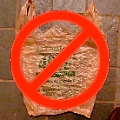- By Dan Veaner
- News
 Print
Print  Paper or plastic? The question may soon be just 'Paper?' -- or 'Reusable?' -- if a law proposed by the Tompkins County Environmental Management Council (EMC) is enacted. The council held a public workshop Wednesday to collect public input on the impact a ban on grocery store plastic bags might have to segments of the local community.
Paper or plastic? The question may soon be just 'Paper?' -- or 'Reusable?' -- if a law proposed by the Tompkins County Environmental Management Council (EMC) is enacted. The council held a public workshop Wednesday to collect public input on the impact a ban on grocery store plastic bags might have to segments of the local community."Having talked to people in other communities, it has gotten a very favorable rating," said EMC Vice-Chair Brian Eden. There is very little resistance or conflict with this program in these other communities. It's just a matter of working through the issues that people are concerned about and coming up with something that meets the needs of our community. I think we can do it."
EMC Chair Steve Nicholson said the EMC was approached by members of the Town of Ithaca board and others who convinced its members to form a plastic bag committee. That group has been meeting monthly, resulting in a resolution passed in May to encourage the Tompkins County Legislature to pass a local law banning single-use plastic bags used to carry merchandise from retail businesses.
The meeting attracted about 30 people from the EMC and Tompkins County government including Legislators Carol Chock, Dooley Kiefer and Tompkins County Solid Waste Manager Barb Eckstrom, Ithaca Councilwoman Tee-Ann Hunter, Chamber of Commerce President Jean McPheeters, and business owners and managers from large businesses like Wegmans and smaller ones including 15 Steps.
One woman said that widespread use of reusable bags would spread disease because they would also be used to carry dirty clothing or be stored in unclean places where they might be exposed to vermin, and then brought back to grocery stores where they would contaminate food offered for sale.
"It is filled with everything that the store is fighting very hard to get rid of," she said. "You are increasing its burden. This is scary to me. If this ever happened to my supermarkets I would gladly drive to Cortland to get my groceries."
She cited studies that show contamination is a problem with reusable bags, but EMC members said the studies they have seen have shown that, while contamination is a concern, it is not proving to be as much of a problem as she claimed. They asked her to share the studies she has seen with them to help them better craft the proposed legislation.
Eckstrom said that while bags returned to grocery stores for recycling may not actually be recycled in some parts of the country, 100% of the bags brought to her facility are. She said an audit trail confirms the destinations of the bags. She also noted that single-use plastic bags do clog Solid Waste Division equipment.
EMC members said that some businesses may choose to give away reusable bags or sell them at a low price, providing a way for low income consumers to get them without hardship. She said that branded reusable bags sold at the Ithaca Farmers Market are popular among tourists who want a keepsake of their visit to the market, which she says is one of the top ten tourist attractions in Tompkins County.
80 U.S. communities have enacted bans on plastic bags. A draft law for Tompkins County was presented Wednesday that would give businesses larger than 5,000 square feet six months to comply, and smaller businesses a year. Violations would incur a $150 fine. A fee would be charged for paper bags, and all stores would be encouraged to sell reusable bags that council members said they hoped could be locally made.
The justification for a law would be to reduce litter and contamination to compost, reduce storm drain clogging and jamming of recycling balers, protect wildlife that might eat parts of the bags, reduce oil and gas usage, and reduce costs to the County. The ban would only apply to so-called 'T-shirt plastic' bags that are used at grocery checkout counters. Bags used for bulk items, bakery goods, produce, frozen foods, meats, fish, prescriptions, newspapers and door hangers, dry cleaning, garbage, pet and yard waste and other uses would be exempt.
McPheeters expressed concerns from Chamber members, including one large business that is about to buy two years' supply of the bags because buying in bulk realizes a significant price savings. Their concern was what would happen to their stock of bags if they were to be banned. She said she was pleased that the EMC is not proposing a new tax that would add layers of paperwork for strapped small business owners. One small business owner challenged the $150 fine saying that if he made a mistake the fine would be significant, but a large business like Wegmans would barely notice such an amount.
Eden said that all the numbers in the law were simply 'plugged in' for the sake of discussion and all details would have to be worked out.
"We have identified a few issues and we want to identify more", said Nicholson. "There is new evidence that says plastic littering the Great Lakes, which touch New York State, may be worse than in the ocean. Right now there are a hundred billion bags produced in the U.S. and less than 5% are recycled. We don't know the figures in Ithaca exactly, but nation-wide they are closer to 1%."
Eden encouraged people to communicate ideas and concerns to the EMC, Chamber of Commerce or Downtown Ithaca Alliance. He said the initiative is still in its early stage and EMC intends to generate input from the community so a law will meet the needs of the entire community.
v9i36



